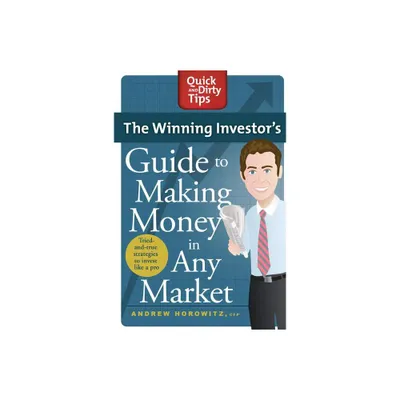Home
Winning the Institutional Investing Race: A Guide for Directors and Executives
Loading Inventory...
Barnes and Noble
Winning the Institutional Investing Race: A Guide for Directors and Executives
Current price: $39.99


Barnes and Noble
Winning the Institutional Investing Race: A Guide for Directors and Executives
Current price: $39.99
Loading Inventory...
Size: Paperback
*Product Information may vary - to confirm product availability, pricing, and additional information please contact Barnes and Noble
The complexity of investments continues to grow, and institutional pools of capital from endowments to pension funds are suffering from too much risk and not enough return. Yet managing these investments and creating and implementing governance structures are seldom an integral part of the organization’s core mission or its operations. "That’s the way it has always been," say many directors and executives. As a result, a board of directors or investment committee often believes it needs to make all the decisionsor outsource money management and hope for the best.
As Winning the Institutional Investing Race: A Guide for Directors and Executives makes clear, that sentiment is a big mistake that can lead to poor returns, reduced capital to employ on behalf of the organizational mission, and even charges of malfeasance on the part of directors. Authors Michael Bunn and Zack Campbell, who advise companies and institutions on best practices in institutional investment, are determined to help institutions and companies learn to manage their capital funds like the real businesses they are. This hands-on book will show you:
• The importance of governance in creating and overseeing investment policy
• The roles and responsibilities of key stakeholders, especially board members
• How to construct an effective investment policy statement
• An overview of the four primary governance models available to trustees and the pros/cons of each
• How to work with fund managers, in house or out, to get the highest returns possible
Besides governance, this book covers a wide array of investment topics—modern portfolio theory, risk application, investment manager evaluation and manager search, asset allocation, and diversification, among others—while introducing a new and successful approach to managing investment portfolios. The goal is to provide a grounding in investing for those involved in making financial decisions at the board level. As the authors make clear, it is not possible just to beat the averages but to do so consistently.
Winning the Institutional Investing Race: A Guide for Directors and Executives offers a healthy rethinking of investment management and governance for any organization or board that oversees institutional investments and manages those making investment decisions. Most important, it shows how directors and managers can maintain their fiduciary responsibilities to the organizations they serve while maximizing investment returns.
As Winning the Institutional Investing Race: A Guide for Directors and Executives makes clear, that sentiment is a big mistake that can lead to poor returns, reduced capital to employ on behalf of the organizational mission, and even charges of malfeasance on the part of directors. Authors Michael Bunn and Zack Campbell, who advise companies and institutions on best practices in institutional investment, are determined to help institutions and companies learn to manage their capital funds like the real businesses they are. This hands-on book will show you:
• The importance of governance in creating and overseeing investment policy
• The roles and responsibilities of key stakeholders, especially board members
• How to construct an effective investment policy statement
• An overview of the four primary governance models available to trustees and the pros/cons of each
• How to work with fund managers, in house or out, to get the highest returns possible
Besides governance, this book covers a wide array of investment topics—modern portfolio theory, risk application, investment manager evaluation and manager search, asset allocation, and diversification, among others—while introducing a new and successful approach to managing investment portfolios. The goal is to provide a grounding in investing for those involved in making financial decisions at the board level. As the authors make clear, it is not possible just to beat the averages but to do so consistently.
Winning the Institutional Investing Race: A Guide for Directors and Executives offers a healthy rethinking of investment management and governance for any organization or board that oversees institutional investments and manages those making investment decisions. Most important, it shows how directors and managers can maintain their fiduciary responsibilities to the organizations they serve while maximizing investment returns.











![The How to Make Money in Stocks Complete Investing System: Your Ultimate Guide to Winning in Good Times and Bad [With DVD] (Paperback)](https://cdn.mall.adeptmind.ai/https%3A%2F%2Fimages.booksense.com%2Fimages%2F114%2F752%2F9780071752114.jpg_medium.webp)






